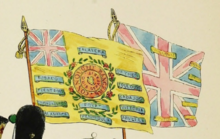88th Foot
| 88th Regiment of Foot (The Connaught Rangers) | |
|---|---|

Regimental Colours
|
|
| Active | 1793–1881 |
| Country |
|
| Branch |
|
| Type | Line Infantry |
| Role | Line Infantry |
| Size | 1 battalions (two battalions 1805–1816) |
| Garrison/HQ | Renmore Barracks, Galway |
| Nickname(s) | The Devils Own |
| Motto(s) | Quis Separabit (Who shall separate us?) |
| Engagements |
French Revolutionary Wars Napoleonic Wars Crimean War Indian Rebellion |
The 88th Regiment of Foot (Connaught Rangers) ("the Devil's Own") was an infantry Regiment of the British Army, raised in 1793. Under the Childers Reforms it amalgamated with the 94th Regiment of Foot to form the Connaught Rangers in 1881.
The regiment was raised in Connaught by John Thomas de Burgh, 13th Earl of Clanricard as the 88th Regiment of Foot (Connaught Rangers), in response to the threat posed by the French Revolution, on 25 September 1793. The regiment was sent to join the Duke of York's army in the Netherlands in summer 1794 as part of the unsuccessful defence of that country against the Republican French during the Flanders Campaign. The regiment embarked for the West Indies in autumn 1795 and, after a difficult voyage, two companies took part in the capture of Grenada and the siege of Saint Lucia before returning to England in summer 1796. The regiment then embarked for India in January 1799 and arrived in Bombay in June 1800. The regiment sailed from India for Egypt in December 1800 for service in the Egyptian Campaign reaching Cairo in the day that the French troops surrendered. It arrived back in England in May 1803.
A second battalion was raised in Dumfries in November 1805. The 1st Battalion sailed from Falmouth for the Cape of Good Hope in November 1806. The battalion sailed for South America in April 1807 and took part in the disastrous expedition under Sir Home Popham: it saw action in the unsuccessful attack on Buenos Aires in July 1807. Two companies were ordered to remove the flints from their rifles before they went into action which effectively rendered them defenceless. After a lengthy fight the battalion surrendered. Captain William Parker-Carroll remained in Río de la Plata and was well-treated by the Spanish troops. The rest of the battalion, once released, embarked for home and arrived at Portsmouth in November 1807.
...
Wikipedia
